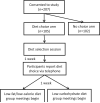Factors associated with choice of a low-fat or low-carbohydrate diet during a behavioral weight loss intervention
- PMID: 25149197
- PMCID: PMC4861996
- DOI: 10.1016/j.appet.2014.08.023
Factors associated with choice of a low-fat or low-carbohydrate diet during a behavioral weight loss intervention
Abstract
Individuals undertaking a weight loss effort have a choice among proven dietary approaches. Factors contributing to choice of either a low-fat/low-calorie diet or a low-carbohydrate diet, two of the most studied and popular dietary approaches, are unknown. The current study used data from participants randomized to the 'choice' arm of a trial examining whether being able to choose a diet regimen yields higher weight loss than being randomly assigned to a diet. At study entry, participants attended a group session during which they were provided tailored feedback indicating which diet was most consistent with their food preferences using the Geiselman Food Preference Questionnaire (FPQ), information about both diets, and example meals for each diet. One week later, they indicated which diet they chose to follow during the 48-week study, with the option of switching diets after 12 weeks. Of 105 choice arm participants, 44 (42%) chose the low-fat/low-calorie diet and 61 (58%) chose the low-carbohydrate diet. In bivariate analyses, diet choice was not associated with age, race, sex, education, BMI, or diabetes (all p > 0.05). Low-carbohydrate diet choice was associated with baseline higher percent fat intake (p = 0.007), lower percent carbohydrate intake (p = 0.02), and food preferences consistent with a low-carbohydrate diet according to FPQ (p < 0.0001). In a multivariable logistic regression model, only FPQ diet preference was associated with diet choice (p = 0.001). Reported reasons for diet choice were generally similar for those choosing either diet; however, concerns about negative health effects of the unselected diet was rated as more influential among participants selecting the low-fat diet. Only three low-carbohydrate and two low-fat diet participants switched diets at 12 weeks. Results suggest that when provided a choice between two popular weight loss dietary approaches, an individual's selection is likely influenced by baseline dietary intake pattern, and especially by his or her dietary preferences. Research is needed to determine if congruency between food preferences and dietary approach is associated with weight loss.
Trial registration: ClinicalTrials.gov NCT01152359.
Keywords: Carbohydrate-restricted; Choice behavior; Diet; Fat-restricted.
Published by Elsevier Ltd.
References
-
- Burke L, Warziski M, Styn M, Music E, Hudson A, Sereika S. A randomized clinical trial of a standard versus vegetarian diet for weight loss. The impact of treatment preference. International Journal of Obesity. 2007;32:166–176. - PubMed
-
- Coles LT, Fletcher EA, Galbraith CE, Clifton PM. Patient freedom to choose a weight loss diet in the treatment of overweight and obesity. A randomized dietary intervention in type 2 diabetes and pre-diabetes. The International Journal of Behavioral Nutrition and Physical Activity. 2014;11:64. - PMC - PubMed
-
- Craig CL, Marshall AL, Sjöström M, Bauman AE, Booth ML, Ainsworth BE, et al. International physical activity questionnaire: 12-country reliability and validity. Medicine and Science in Sports and Exercise. 2003;35:1381–1395. - PubMed
-
- Drewnowski A. Taste preferences and food intake. Annual Review of Nutrition. 1997;17:237–253. - PubMed
Publication types
MeSH terms
Substances
Associated data
Grants and funding
LinkOut - more resources
Full Text Sources
Other Literature Sources
Medical


